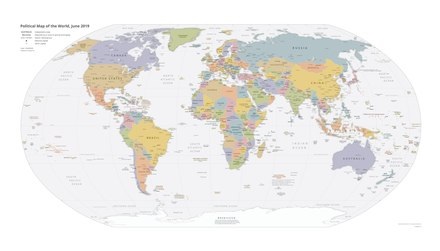|
|
| |
|
|
| |
|
|
|
|
| |
 |
| Political map of
Earth with political borders as of 2019. |
Geography
Geography is the study of the Earth and its features,
its inhabitants, and its phenomena. The word geography
comes from the Greek words gê ("Earth") and graphein
("to write, draw"). It means "to write and draw about
the Earth". The word was first used by a scientist
called Eratosthenes (276-194 B.C.).
Its features are things like continents, seas, rivers
and mountains. Its inhabitants are all the people and
animals that live on it. Its phenomena are the things
that happen like tides, winds, and earthquakes.
A person who is an expert in geography is a geographer.
A geographer tries to understand the world and the
things that are in it, how they started and how they
have changed. |
|
Geography is divided into two main parts called physical
geography and human geography. Physical geography
studies the natural environment and human geography
studies the human environment. The human environmental
studies would include things such as the population in a
country, how a country's economy is doing, and more.
There is also environmental geography.
Geographers need to know a lot about maps because maps
are very important for understanding geography.
Geographers use maps a lot, and often make them. Making
maps is called cartography, and similarly, people who
make maps are cartographers. |
|
Natural environment
Geographers studying the natural environment or physical
geography may look at: |
- Climate
- Landform
- Continents
- Oceans
- Soil
- Rocks
- Rivers
- Mountains
- Endogenetic process
- Exogenetic process
|
|
Human environment
Geographers studying the Human environment may look at: |
- Population
- Countries of the world
- Agriculture
- City
- Industry
- Energy
- Pollution
- Air pollution
|
|
|
|
|
|
|
|
|
|
|
|
|
|
|
|
|
|
|
Search Fun Easy English |
|
|
|
|
|
|
|
|
|
|
|
|
|
|
|
About
Contact
Copyright
Resources
Site Map |